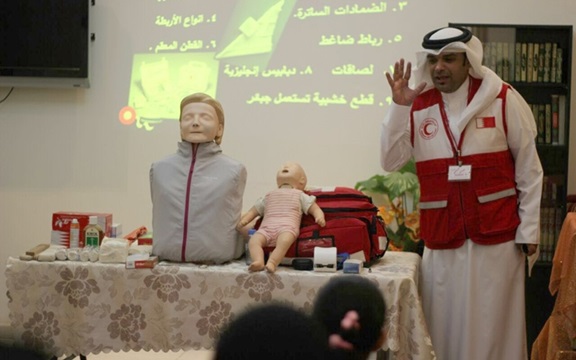Bahrain Red Crescent Society is calling communities to be equipped with life-saving skills, be it in times of everyday crises, disasters or conflicts. It has provided 34 first aid training sessions, where 398 of trainees obtained International Paramedic Certificate during the first half of this year.
BRCS Director General Mubarak Al Hadi revealed that this move is not only recognition of the Red Crescent’s leading position as a first aid provider and of its global reach. It is also to boost the profile of Bahrain Red Crescent conducting first aid training for citizens and residents since the eighteens of the last century, adding that the training is often conducted upon institutions, agencies, and government bodies’ request to reinforce the emergency preparedness and response capacity of its staff.
Al Hadi explained that training includes BRCS volunteers, with the aim of providing more qualified volunteers, improving the capacity of the association’s volunteers through training and rehabilitation and enhancing the personal abilities of the trainees by focusing on their abilities and needs.
“First Aid is a question of life and death. Knowledge and quick action performed by bystanders in the face of a crisis can make the difference. We rely on these everyday heroes to help save lives.” Al Hadi added.
“The Red Cross Red Crescent has been the world’s leading first aid trainer and provider for more than 100 years. In 2012, more than 14 million people were trained in 77 countries,”
“The International Federation of Red Cross and Red Crescent Societies (IFRC) is the world’s largest volunteer-based humanitarian network, reaching 150 million people each year through our 189 member National Societies.” Said BRCS Director General
For his part, Mr Kadhem Alqallaf, Head of First Aid Committee, pointed that 15 certified trainers perform the task of administering and delivering first aid courses at the BRCS, noting that the four days training course includes 20 hours of training and an examination conducted by a certified Paramedic specialist.
Alqallaf explained that the BRCS developed guidelines, detailing the local implementation of first aid training, the objectives and educational methods to be used, the evaluation process and the choice of equipment suitable to local living and working conditions. Training courses usually includes theoretical and practical parts, and dealt with many axes, including burns, fractures, pulmonary resuscitation, transfusion, and haemorrhage and fainting.
“People with first aid skills and the confidence to use them are heroes, regardless of where and who they are. This idea applies to any disaster: a typhoon affecting thousands or a road accident in the middle of the day.”
“Our vision and our commitment is that as many people, at any age, can be equipped with life-saving skills in their own community. Most of us have – or will at some time – encounter a situation where first aid is needed. Saving lives is a matter of skills that can be learned by everyone, everywhere.”
Bahrain Red Crescent Society has launched the first of kind in Bahrain, a First Aid Smartphone application “Bahrain Aid”. The applications views important news, updates, tips and advice regarding first aid.

